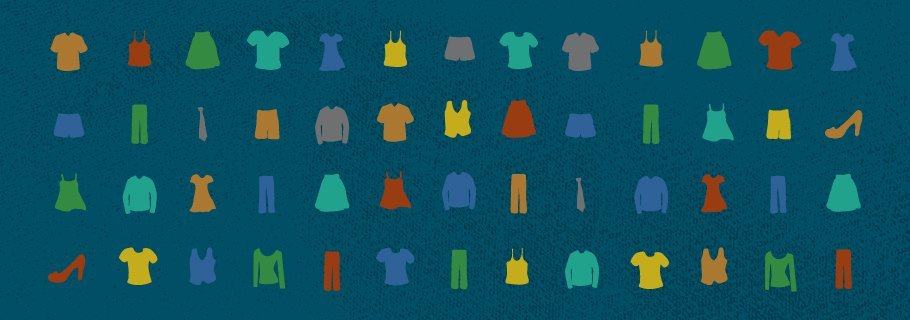Yesterday I began a short series of articles on the always-tricky subject of modesty. I’m sure this will not be the final word on the subject, and I cannot cover every aspect of it, but I do want to get us thinking and talking about modesty. At the very least I will give you something to agree or disagree with—usually a good way to stimulate your own thoughts. Thanks to all those who left comments and feedback. You should begin with part one: Modesty Matters.
Yesterday we looked at Colossians 2:20-23 to see that as sinful human beings we love to make and to break rules; when we come to tricky areas of life, we can very quickly take refuge in rules, and this is exactly what many discussions of modesty turn into. We also saw that the heart of modesty is dressing in such a way that you show love to others and bring glory to God, while the heart of immodesty is dressing in such a way that you show self-love and claim the glory for yourself.
Today I would like to begin with 1 Peter 3:1-4:
Likewise, wives, be subject to your own husbands, so that even if some do not obey the word, they may be won without a word by the conduct of their wives, when they see your respectful and pure conduct. Do not let your adorning be external—the braiding of hair and the putting on of gold jewelry, or the clothing you wear—but let your adorning be the hidden person of the heart with the imperishable beauty of a gentle and quiet spirit, which in God’s sight is very precious.
In this passage, Peter is speaking to a very select group of people—married women whose husbands are followers of a different religion. He knows these women will face some very specific challenges and offers them some pointed guidance. What you and I do when we read passages like this is to try to understand what the author said to his original audience and then learn how we can apply those principles to our own lives. We find that the biblical principles always have wide application.
There are three things I would like to draw out of these verses. We will look at the first two today and wrap up tomorrow with the third.
We All Want to Be Noticed
The first thing we can take from these verses is this: sinful people want to be noticed. Peter writes, “Do not let your adorning be external—the braiding of hair, the wearing of gold, or the putting on of clothing.”
Remember the definition of modesty I proposed yesterday: Modesty is a virtue that shows love to others and brings glory to God through appropriate dress. What were these women doing that violated this? They were probably over-dressing and going to church to show off. They wanted to be known as beautiful, so wore clothes that were too fancy for the context. They had their hair done up for prom instead of for worship. It would be like us showing up for church wearing a tuxedo or a prom dress. We would be overdoing it in order to be noticed.
Right away we need understand what Peter is not saying here. He is not telling these women “do not braid your hair and do not wear gold jewelry,” since otherwise he would also be telling them, “do not wear clothes.” What he is telling them is that they need to guard themselves against letting their adorning be external. He is telling them not to make the primary display of their beauty be through a fancy hairdo, through precious jewelry or through designer clothes. These should not be the things they want to be known and remembered for.
God has made us so that we value beauty and want to display it.
Peter acknowledges that these women have a desire to display beauty. This is a good thing; God has made us so that we value beauty and want to display it. We know that beauty is better than ugliness. But Peter knows that these women will face the temptation to want to be known and remembered for a specific kind of beauty. They will be prone to care most for their looks, for their hair, for their clothes, and for other outward things. So he tells them that this kind of external beauty is not the most important thing.
It is simple enough to widen this principle. Each of us may be tempted to draw attention to ourselves through what we wear. Consider meeting someone for the first time. If you have just a few minutes together, how do you want that person to remember you? Is it important that they know and remember you as the person with the style, with the nice clothes, with the hair done up just right? Some women, and perhaps especially young women, want to be known and remembered as beautiful. Some men are just really handsome and want to be known that way. Or maybe they want to be acknowledged as sharp dressers or grunge dressers or hipsters or something else. On some level, each of us may face this temptation to be known, remembered and respected for outward things. And if we give in to this temptation, we will soon begin to act on it.
Modesty Wants God To Be Noticed
The second thing we can learn from this text is that modesty wants God to be noticed. It wants God to be glorified. Modesty prevents people from being distracted by matters of lesser importance and instead allows them to appreciate godly character. This in turn directs praise and appreciation to God himself. Peter writes, “Let your adorning be the hidden person of the heart and the imperishable beauty of a gentle and quiet spirit, which in God’s sight is very precious.”
As much as God values external beauty, he values internal beauty much more.
Note that he uses the word precious. He has just told them not to build their beauty upon precious jewels and precious clothes, and now he speaks about a different kind of precious. He tells them that though they value these external things that look so beautiful and attract such attention, they need to learn to see things from God’s perspective. As much as God values external beauty, he values internal beauty much more. There is nothing God values more than godly character, his own attributes displayed in the lives of his people. This godly character showcases the traits that only he can give and in that way brings glory to him. This is true beauty. The truest and best kind of beauty is displayed not through clothes but through godly character traits such as gentleness and respect even in the face of difficulty.
We are drawn to the outside. We judge a book by its cover, a movie by its poster, a woman by her makeup, a man by his suit. But God cares so much more for what is hidden within. Peter warns these women that they are drawn to the outside and want people to judge them based on what they wear, how they do their hair, how expensive their jewelry is. But they need to reorient their value system to match God’s. They may be putting all of this effort into the outside at the expense of neglecting what matters so much more.
God is not impressed by beautiful clothes that mask an ugly heart.
There are two warnings here. The first is that these things that look so attractive may actually be ugliness in disguise. Beauty without godliness is ugliness. God is not impressed by beautiful clothes that mask an ugly heart. The best, truest and rarest beauty flows out of godly character. We are so easily distracted and fooled, but God is not.
The second warning is that these qualities that look so attractive are only temporary. A woman may be utterly stunning right now, but it takes only one bad accident or one disfiguring disease to eradicate it all. And then what? Then there will be a double ugliness. And even if she avoids accidents and disease, she will not escape the slow march of time that inevitably sends beauty into decline. A man may be known for his designer fashion sense, but one stock market crash or one downsizing at work and he may be shopping at the thrift store. What will he have left in that day?
Peter warns that we need to pursue what is permanent and to be far more concerned for inner beauty than outer beauty. Beauty is not bad, it is just temporary. It will inevitably fade away and be gone. But inner beauty lasts through trial and circumstance and old age and far beyond.
Here is a pertinent question for all of us: When it comes right down to it, do you want to be noticed? Or do you want God-in-you to be noticed? This is a crucial difference between modesty and immodesty. One wants to be noticed. The other wants God to be noticed.
This series will continue (and, I believe, wrap up) tomorrow.










